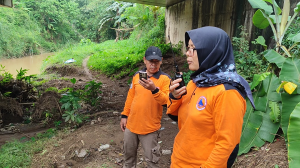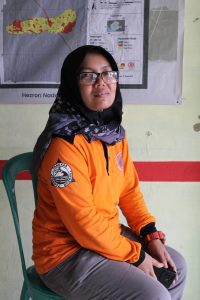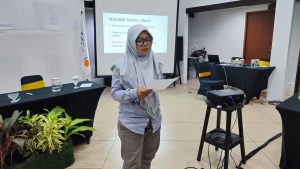In the heart of Talang Baru Village, South Lampung District, where the rhythms of daily life often follow the patterns of weather and tradition, lived a woman whose quiet dedication eventually became a catalyst for resilience. Siti Zubaidah, known to her neighbors simply as Siti, was never the loudest voice in the room, but she listened. And in those silences, she heard the stories, the warnings, and the pleas hidden within memories of floods, of loss, and of survival.
The Weight of History
Growing up in Talang Baru, Siti had long been familiar with the stories of flooding that would sweep through the village during heavy rains. These were not just distant tales told by the elderly but vivid narratives embedded in the village’s soil and soul. In the 1990s, she recalled how a great flood devastated her community, destroying three homes and scattering lives. That moment, though long past, left a lasting imprint on her.
But for many years, disaster risk reduction remained an abstract concept for most villagers. There were no clear roles, no defined protocols, and very little awareness. “Before,” Siti remembered, “when water entered the village, it was panic first, action later. There was no structured response.” The community’s approach was reactive, not proactive.
The First Step Toward Change
In 2011, things began to shift. Siti became involved with Destana, a village disaster preparedness group initially formed by BPBD, the regional disaster management agency. While the early phase of her involvement was limited, she was intrigued by the possibility of helping her community through social and humanitarian efforts. “I’ve always felt drawn to social causes,” she said, “because I believe people should help people.”
Still, the journey was far from smooth. As one of only a few women in a male-dominated space, and lacking formal disaster response training, Siti often second-guessed her role. But everything changed when ASB S-SEA (Arbeiter-Samariter-Bund South and South-East Asia), a humanitarian organisation, launched the PASTI II programme in Talang Baru, a community-based initiative to build inclusive disaster preparedness that is funded by Aktion Deutschland Hilft (ADH).
A Turning Point with PASTI II
Through the PASTI II programme, Siti found her spark.
What began as curiosity turned into passion as she participated in capacity-building sessions, community discussions, and practical training modules. One of the most transformative experiences for her was being selected as a facilitator to help develop inclusive disaster protocols alongside fellow villagers, including people with disabilities.
“At first, many were shy,” she shared. “Some didn’t feel they belonged, others were unsure of their place in the process. But slowly, with encouragement and support, they saw they had value.”
This exposure changed Siti profoundly. She saw firsthand the resilience, intelligence, and strength of people who had often been sidelined in village decisions. “If they can do it, why can’t I?” she often asked herself.
Awakening the Village
With her newfound confidence and knowledge, Siti became a driving force behind changes in Talang Baru. She wasn’t just a participant. She became a bridge between government officials, disaster groups, and marginalized community members.
She helped lead the creation of a disaster response protocol that clearly outlined each stakeholder’s role. “Before, only the village head was expected to act. Now, everyone knows what to do,” she explained. Through this clarity, disaster response in Talang Baru shifted from chaotic reaction to coordinated readiness.
More importantly, Siti advocated for the inclusion of people with disabilities in every step of planning and response. “They don’t just need help,” she stressed. “They want to contribute, and they can. We just need to listen and give them space.”
Through her, village leaders began to understand that inclusive planning wasn’t just an ethical choice. It made disaster responses stronger and more effective.
Changing the Culture of Preparedness
What began as technical training soon blossomed into cultural transformation. Neighbors who once waited for the worst to happen now organized drills. Data on household members, especially those with specific needs, was updated regularly. People began speaking up, asking questions, and offering ideas. “This didn’t happen overnight,” Siti said. “But it started happening.”
When asked what moment impacted her the most, Siti reflected on her experience working alongside a fellow facilitator from Cianjur, a person with a disability. “They inspired me,” she said with quiet emotion. “If they, with all the barriers they face, can stand and lead. Then I, with fewer limitations, have no excuse.”
Guided by Compassion and Purpose
What makes Siti’s story powerful is not just the external change she helped facilitate, but the internal transformation she underwent. “Before, I saw myself as someone who helped out when asked. Now, I see myself as someone who takes initiative.”
Her role as a village official has evolved. No longer just a government functionary, she now leads with purpose and a deep sense of social responsibility. “If our village is to be strong,” she often says, “it has to be united. If our response is to be effective, it must be inclusive.”
She drives change with a collaborative, compassionate, and deeply rooted empathy style. And that’s precisely why it works.
The Road Ahead
 While the PASTI II program has laid a solid foundation, Siti knows the work isn’t done. She dreams of a day when every member of her village—regardless of ability, gender, or status—feels empowered to take action during a disaster. She envisions schools integrating preparedness education into their curriculum, youth groups organizing simulations, and elderly residents knowing exactly whom to call in an emergency.
While the PASTI II program has laid a solid foundation, Siti knows the work isn’t done. She dreams of a day when every member of her village—regardless of ability, gender, or status—feels empowered to take action during a disaster. She envisions schools integrating preparedness education into their curriculum, youth groups organizing simulations, and elderly residents knowing exactly whom to call in an emergency.
“We’re not waiting anymore,” she said. “We’re preparing.”
Planting Seeds for a Stronger Tomorrow
Siti’s story is a testament to the transformative power of community-driven development. Her journey reminds us that meaningful change doesn’t always start with grand declarations. It often begins with someone listening, caring, and stepping forward.
In a village once defined by vulnerability, she is helping forge a new identity. One of readiness, unity, and shared responsibility.
And perhaps, most importantly, she has proven that real resilience begins not with systems or protocols, but with people like her, who choose to rise, include others, and never look back.



